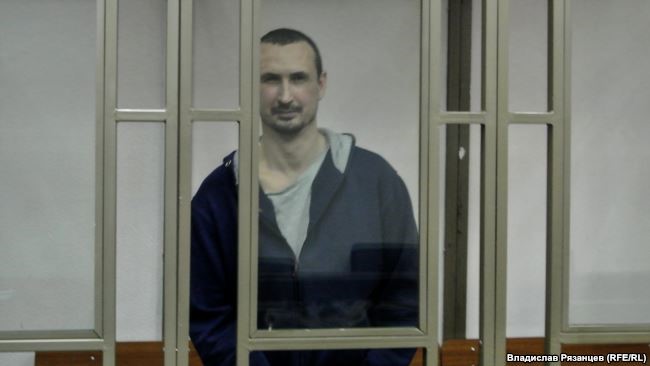Russia sentences Crimean activist to six years for social media posts

Yevhen Karakashev, a 40-year-old left-wing activist from Yevpatoria in occupied Crimea, was jailed for six years by a Russian court on 19 April, with the charges based solely on very old posts on the social network VKontakte. Russia’s FSB claimed that the posts well under Article 205.2 of Russia’s criminal code which punishes for something called ‘public calls to carry out terrorist activities, public justification of terrorism or propaganda of terrorism’. Evidence to back the charges was highly suspect and there are strong grounds for believing that the one real ‘witness’ gave his testimony under duress.
The sentence was three years less than that demanded by the prosecutor, and also includes a ban on administrating Internet websites for two years. Karakashev’s lawyer Alexei Ladin says that they will be appealing. Not only was his client’s guilt not proven, he says, but there was no element of a crime in the charges. He has previously called this case a violation, not only of international law, but of Russia’s Constitution, since it is a direct attack on freedom of speech. and you should not try people for their words.
Although the Memorial Human Rights Centre has not yet formally declared Karakashev to be a political prisoner, it has added him to its list of likely victims of political persecution. There is a strong likelihood, Memorial HRC states, that “the criminal proceedings against Yevhen Karakashev were initiated in the context of his opposition civic and political activities as a frequent participant in protests in Crimea.” They view this as part of a mounting attack on left-wing activists and anti-fascists since January 2018.
The Russian-controlled prosecutor in Crimea claimed that athe end of 2014, Karakashev had made a pronouncement during a social media chat with other Crimean anarchists which “contained linguistic and psychological signs of incitement to carry out violent, destructive actions (blowing up cars, buildings, state authorities)”.
In fact, Karakashev explains that he merely asked the other participants in the chat whether they thought the actions of the so-called Prymorsky Partisans made sense. The ‘partisans’ in question were six vigilantes who waged a bloody war against the Russian police. While it may be impossible to condone the shocking methods the six men used, calling discussion of these methods ‘incitement to terrorism’ seems seriously stressed.
It was earlier reported that one of Karakashev’s posts on the social network VKontakte was a video of the last interview given by the Prymorsky Partisans who explained that they had declared war on the police because of the brutality and corruption entrenched in the Russian police force. The video was declared ‘extremist’ by a court in Russia, and copies of the interview posted on social media before the court ruling and forgotten, are used, when the FSB can’t find another pretext, for questionable prosecutions.
It is likely that the main witness against Karakashev, Sergei Vasylenko, gave his testimony under duress. Vasylenko was prosecuted and imprisoned for 10 days in November 2016 after calling on people to boycott Russia’s illegal elections. Just before this, he posted an appeal on YouTube in which he spoke of attempts to bring criminal proceedings against him for supposed incitement to enmity.
During the hearing on 21 March, Ladin asked about these attempts. This was undoubtedly a legitimate question, given the fact that he is the only person who has gone along with the prosecution’s claims. Nonetheless, Vasylchenko’s request to the court for permission to not answer was allowed. As Ladin noted, the court was thus depriving him of the possibility of proving whether a key witness was likely to be telling the truth. Vasylenko’s testimony clashes with that of at least two participants in the chat who made it clear in court that they felt a single phrase had been pulled out of context. The phrase was then sent to the FSB’s obliging ‘experts’ who claimed to see in it ‘propaganda of the ideology of violence’ and ‘calls to carry out terrorist activities’.
Karakashev first attracted Russian FSB attention in the summer of 2016 when a group of Crimean anarchists were prevented by police from holding a picket outside the FSB office in support of Ukrainian political prisoner (and fellow anarchist) Oleksandr Kolchenko and other political prisoners.
Then on 1 February 2018, enforcement officers burst into Karakashev’s home in Yevpatoria, forced him to the floor, with his arms behind his back in handcuffs. A search was carried out of his home, and he was taken away and remanded in custody the following day. There was a long period in police custody before he was able to phone a friend and ask for a lawyer to be contacted, and it seems likely that the multiple abrasions and other injuries were sustained during that period. These were ignored by the ‘judge’ who remanded Karakashev in custody, and the police have since refused to initiate proceedings over his injuries.
Karakashev is already (without any final verdict) on Russia’s notoriously long ‘List of Terrorists and Extremists’ together with Ukrainian filmmaker Oleg Sentsov, Oleksandr Kolchenko, Ruslan Zeytullaev, human rights activist Emir-Usein Kuku and an ever-increasing number of other Ukrainian political prisoners.





